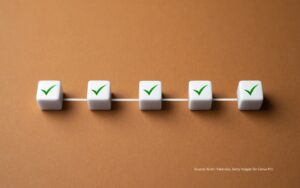I could feel waves of stress pouring out from her as she sat down, and before I could say anything, she exclaimed, “I feel like a failure!” Saying it out loud unleashed a torrent of tears down her cheeks.
Josephine, a young, ambitious star within her organization, had set her sights on achieving a promotion to director, which, in her mind, would give her a seat at the table. She had built up this promotion as a “must-do” in her career journey. When she heard the bitter news that her organization had offered the role to an outside candidate, she felt blindsided.
Her thoughts went wild with internal objections like, “That wasn’t the plan!” “I was more qualified than anyone else.” “I know the organization better than any other candidate.” “Why not me?”
To Josephine, it was failure wrapped in the rejection of all her sacrifices over the past few years.
Why Do I Feel Like a Failure?
“Failure” is simply the lack of success, and we all know that is part of life. Indeed, many successful people kindly remind us that they, too, have endured failure, yet this wholly expected human experience remains fraught with emotion. I have sat across from many other clients who, like Josephine, had high expectations for a goal, only to walk away disappointed. Feeling like a failure is a normal reaction when things don’t turn out how we want, but it can spiral into other negative thoughts and feelings like shame, worthlessness, frustration, or blame.
Why does that happen?
Through my work with thousands of clients, I have discovered that failure is a state of mind shaped by the world around us. As children, we learn by observing the people and media in our environment, gradually absorbing messages about what it means to be successful and what it means to fail. Then, as adults, we look for signals in the world that either validate or contradict those definitions. For many, that can lead to unrealistic expectations.
If we receive the message that we should experience feelings of failure when we are unsuccessful in reaching an objective, that becomes our default. We develop the black-and-white point of view that we are a failure anytime we don’t get a job we want, finish a project on time, or succumb to a snack when dieting. That can cause a range of emotions, mostly negative, which can snowball into emotional distress or even mental health conditions when left unaddressed.
Recognizing the Myths Surrounding Failure

Fortunately, we don’t have to succumb to that pressure. If we accept that failure is a state of mind, it becomes easier to stop feeling like a failure anytime we don’t achieve our goals. Yet the emotions will still bubble up, so the trick is to learn to acknowledge those emotions and then reframe them and work through the feelings. That takes time, practice, and, sometimes, the help of a good coach or mental health professional.
When I work with clients who struggle with feelings of failure, it helps to clarify what success looks like for them and how their definitions of success and failure developed. That can help them look at the situation more objectively and address their fear of failure by determining the change they want to pursue.
Failing to reach a goal can challenge our identity and make us question our self-worth. In Josephine’s case, she felt that the promotion would be a form of validation – a reward for all the late nights and weekends she worked to show that she was a “team player.” She identified strongly with being a “star” in the organization, so when she didn’t get the promotion, it challenged her sense of self.
Josephine had never not succeeded. She was an academic star through college, graduate school, and her career. After every “win,” she immediately began plotting her strategy for a subsequent success. However, success is a cruel monster that we must feed constantly. For Josephine, the absence of success meant failure, so she experienced this setback as a massive blow.
I also realized that she had internalized some myths about success and failure. That is important to remember because internalized myths can filter our worldview, contributing to our feelings of failure without us realizing it. Let’s explore these myths one by one.
Four Myths Around Failure
The Lack of a Specific Outcome = Failure
Feelings of failure happen when there is a clash between the anticipated outcome and the actual results. However, sometimes success isn’t even possible because the goal is too narrow. That is an opportunity to reframe, expand your perspective, and look around. Sometimes, we get so focused on a specific desired outcome that we miss opportunities for something even better.
I’ve Failed if It Doesn’t Happen in a Specific Timeframe
Another way people articulate this myth is that if it doesn’t happen this time, it never will. Yet, in reality, transformative change often occurs over long periods. Once you accept that, you will have another opportunity to pause, examine the situation, and recalibrate what you want.
If Others Say It’s a Failure, Then It’s a Failure
This is partly true since we define success and failure by deciphering signals from the world around us. However, that doesn’t mean we must accept those signals. Why should another person’s definition of failure apply to you?
Feeling Guilt and Shame Around Failure is Abnormal
This myth is false – feeling varied and complex feelings about failure (including relief, grief, annoyance, anger, etc) is entirely normal. Your response to failure is a personal process. Acknowledging that these feelings are acceptable will help us navigate them and find creative solutions.
What to Do When You Feel Like a Failure
A saying people often misinterpret is, “Failure is a learning opportunity.” They see that as “What do I need to do differently so I won’t have to deal with this again.” However, I would argue that changing your behavior without doing any introspective work is a mistake. It could set you up for a lifetime of charging into situations that lead to outcomes that will never work in your favor.

What do I recommend you do instead?
Take the time to reflect on the emotions and decisions that led you to the perceived failure so that you can genuinely learn from your mistakes and experiences. Here are some questions that can get you started on a failure audit:
- How would the circumstances have to differ to lead to another outcome?
- Was this actually a failure, or was it something else?
- How much of the outcome can you attribute to circumstances within your control?
- Is this something that you genuinely wanted or something you thought you wanted? If it was the latter, you may have had one foot on the gas and the other on the brake.
Here is something else to consider: What if you weren’t supposed to succeed? In other words, did you fail, or was the system stacked against you from the start? Sometimes, invisible forces at play (algorithms, internal politics, emotions, etc.) make success nearly impossible.
Open yourself up to multiple possibilities and perspectives on the goal. Our views of success and failure are often limited, but if we analyze them from a learning perspective, we might discover an outcome that would be even better than we imagined. That said, be careful to avoid overanalyzing the situation. We often think we are directly responsible for our failures, but that is not always true. Sometimes, things just don’t work out.
An Example of Learning From Failure
Through our work together, Josephine began to reframe her failure narrative. She had been so focused on reaching the goal of the promotion that she never paused to wonder if she even wanted it to begin with. Josephine realized that throughout her life, she had been socialized with an achievement mindset but never considered what that meant for her. She concluded that if she wanted a professional life that aligned with who she was, she needed to give herself some grace.
Josephine also realized she had developed unhealthy work habits, such as normalizing late nights and weekend work, thinking it would lead to a promotion. She had years of work ahead and had adopted a grueling lifestyle that robbed her of her creative problem-solving skills. One work-free weekend brought that spark back. By allowing herself the opportunity to redesign her work-life choices, she felt like she was stepping into a more balanced and aligned life.
A few months later, another professional opportunity presented itself, and Josephine marveled at how easy it was for her to step into the new role. Today, she looks back at her perceived failure as an opportunity to reset and reconsider what was right for her.





